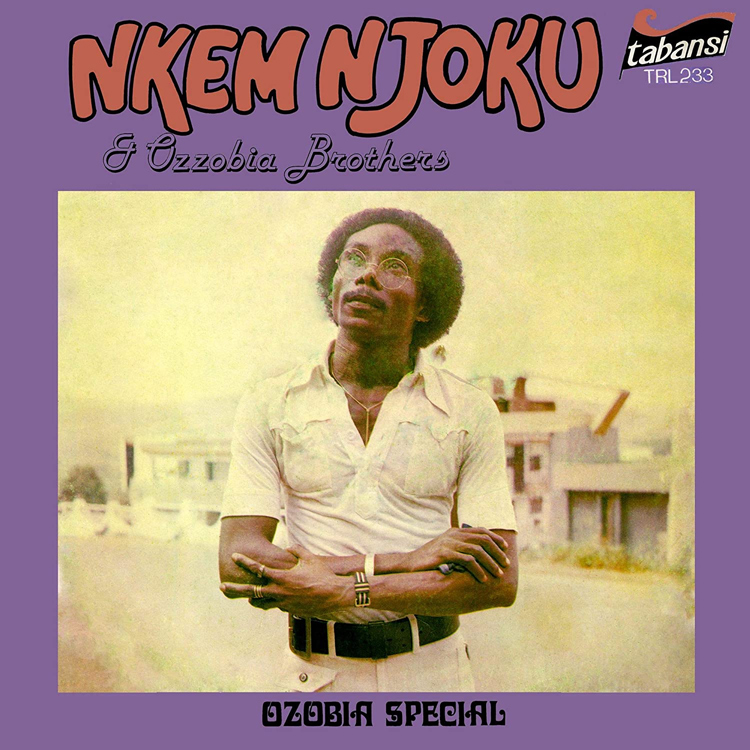An essential album titled Ozobia Special by Nkem Njoku & Ozzobia Sound is now available. This was Nkem Njoku’s one and only album. The producers describe it as an early 1980s Igbo Highlife masterpiece. Compiler John Armstrong provides additional details about the album.
When did you discover the music of Nkem Njoku & Ozzobia Sound?
It was new for all of us here at BBE [Barely Breaking Even Music]. I think I knew the name and I’d once seen a picture of the LP cover, but that was it until we started researching the reissue program.
Was it easy to locate and license the masters?
It was very easy because Joe Tabansi, the catalogue owner, had everything for us.
How would you describe highlife and is there a difference between Ghanaian and Nigerian highlife?
Ghana and Igbo/Nigerian Highlife are very different in musical approach, but are similar in intent- i.e. party music, and also, subsequently, Christian gospel music.
Highlife started in Ghana before World War 2, and found its zenith in Accra of the late 1940s and early 1950s with bandleaders such as ET Mensah. The scene was aspirational, hence the name: you got dressed up and took your date to a smart Accra hotel where the band would be playing all night!
Musically, Ghana Highlife drew initial inspiration from marching-band and military music, hence the predominance of horns and wind instruments in its early phase. Also, Ghana highlife had a number of different modes- for instance, EK Nyame’s ‘sikyi’ highlife style, with its sad, minor key riffs, couldn’t be more different from, say, Eddie Donkor or The Sweettalks- all uptempo celebration music.
Not quite so much with Igbo highlife – which comes from southeast Nigeria where its main fanbase demographic arose; combines that original Ghana highlife sound with traditional Igbo music. A lot of Igbo highlife is in 6/8 tempo, associated with traditional Ogene (cowbell) rhythms, which you’ll rarely, if ever, hear in Ghana highlife.
The Biafran War hit the southeast Nigerian music scene especially hard; many of the great brass and wind players were military men who died in conflict between 1967-70. The result was they had to come up with a smaller band sound and so the guitars-percussion-vocals set-up became standard. If you add to this the proximity of North Cameroon to Igbo country, you then get a big input of francophone and anglophone Cameroon sounds which in turn were influenced by Congolese music, rumba and later soukous.
Igbo guitar band highlife of the 1980s has a very soukous-y feel, but with a stronger percussion sound than is usually associated with Congolese soukous or Cameroon makossa: and it’s that mix that has made Igbo highlife so popular with the Colombian costeño champeta sound systems; it’s a sound that’s almost tailor- made for big speakers, like dub reggae.
What happened to Nkem Njoku after he released this album?
No-one is sure, I’m afraid. One thing: he’s not to be confused with the Georgia, USA, football quarterback star of the same name!
How is the highlife scene in Ghana currently?
The ‘classic’ (i.e. old-school, big-band) highlife scene in Ghana exists in a tiny way, for special occasions, but there’s not really a recording scene for it. Highlife slowly changed into ‘hiplife’ in the late 90s (ie highlife melodies etc influenced by hip hop production and rap sensitivities), and later in the mid-2000s, Azonto- grime/trap/boogie/garage-influenced musically, but still with an old-school highlife theme in some of the lyrics- funny, political, scandalous, risque, etc.
Old-school Igbo highlife is still around but is almost exclusively a vehicle gospel and Christian music; although there is, too, a thriving rap scene in Igbo Nigeria just as there is in Lagos, etc. One of the best – and one of my favorite- Igbo rap artists is Phyno, who often keeps the old-school Igbo 6/8 tempo in his raps, as he does here:


